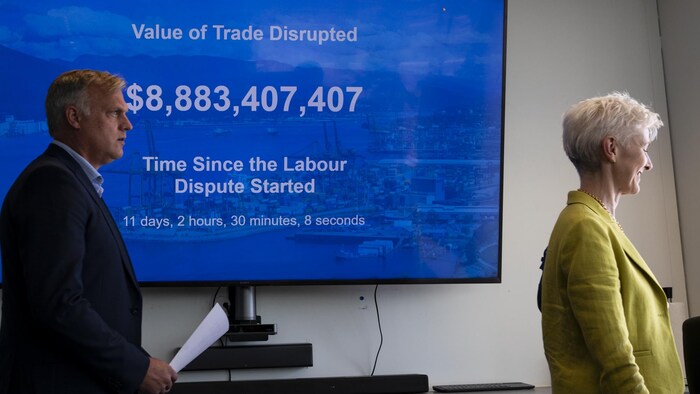The British Columbia Maritime Employers Association (BCMEA) said in a statement Tuesday afternoon that the bipartisan leadership of the International Shipping and Warehouse Workers Union of Canada (ILWUC) had rejected the principle agreement reached last Thursday. Therefore, the initial agreement was not put to a vote by the union’s 7,400 members.
Sit-ins have resumed since 4:30 p.m. Tuesday. union president, Rob Ashton, believes that the initial agreement is not sufficient to protect jobs threatened by outsourcing. In a press release, he made clear that he did not believe the agreement’s recommendations would effectively protect current and future jobs.
He adds that the issue of wages has not yet been resolved in light of the profits made by marine employers in recent years and the high cost of living.
For its part, the BC Marine Employers Association says the labor caucus leadership is choosing to harm Canada’s economy by rejecting this principled agreement.
The agreement proposed a collective agreement of 4 years, a very long period according to the union. The BC Marine Employers Association says it is committed to pay and benefits increases that exceed the 10% rate applied over the past three years. This increase, again according to the employers, exceeded what was proposed in the union regulations in the private and public sectors.
The BC Marine Employers Association said it also wants to address concerns about contracting by focusing on benefit coverage for all casual workers, offering tool allowance and pledging to increase the number of apprentices in the region by 15%.
The Longshore workers were on strike for 13 days beginning July 1, and returned to work on Saturday.
Photo: Radio Canada/Ben Nelms
The leader of the Conservative Party, Pierre Poiliver, sees this rejection of the agreement as evidence of incompetence Seamus O’ReganFederal Minister of Labor. “He said he had secured an agreement to end the strike, but the high costs were returned to consumers, workers and businesses,” he said. Twitter.
For her part, Danielle Smith, the Premier of Alberta, fears hundreds of millions of dollars in losses for producers in her province and in general in the country. “The longer this blow lasts, the less credibility Canada will have as a reliable trading partner,” she wrote on Twitter.
Disappointment at work
The Canadian citizen responded to the announcement of the resumption of the strike by saying, “Concerned about the repercussions of the work stoppage on the North American economy and on Canada’s reputation as a trading partner.”
Our supply chains need reliability, stability and predictability to function properly. We urge the government and both parties to do whatever is necessary to get goods flowing again.
Matthew Holmesthe Canadian Chamber of Commerce’s senior vice president for policy and government relations, says he was not surprised by the outcome, and says he had a hunch that this initial agreement could not have been made in good faith with the union.
We feel that there is a lack of political guidance. We want to see the government and all political parties summon Parliament to pass a special law that will force a return to work until the two parties agree to settle all this. »
The counter displays an estimate of losses from the strike, according to the Greater Vancouver Board of Trade. (file photo)
Photo: Radio-Canada/Justin Bolin
Same story with the Greater Vancouver Chamber of Commerce. the boss, Bridget AndersonShe declares herself disappointed by rejecting the agreement on principle.
“Unfortunately, we have to restart our port closure counter which estimates that approximately $800 million worth of cargo is disrupted daily,” she said in a statement. It thus refers to a tool unveiled last week to put pressure on the federal government.

“Music guru. Incurable web practitioner. Thinker. Lifelong zombie junkie. Tv buff. Typical organizer. Evil beer scholar.”

![[VIDÉO] LPHF: Like Cole Caufield, Ann-Renée Desbiens has her own unique shoes](https://m1.quebecormedia.com/emp/emp/63411_07894593662cf2-8a9e-4bd6-aa34-c999d634a876_ORIGINAL.jpg?impolicy=crop-resize&x=0&y=291&w=3492&h=1966&width=1200)






More Stories
The event was disrupted by protesters Baptism of fire for the “Santi Quebec rifle”
Low interest rates: “There is hope,” says senator and economist Clement Gignac.
The electronic method of submitting your taxes remains popular among Quebecers